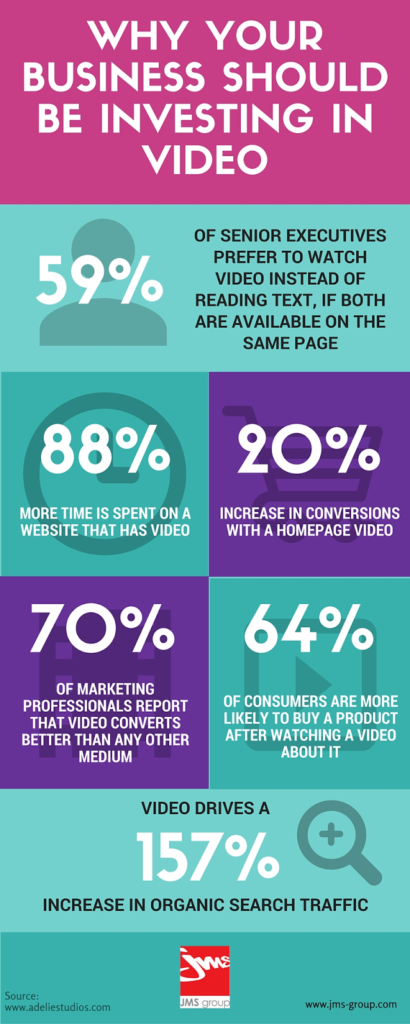Why You Should Use Video Marketing for Small Business
Video marketing for medium to small businesses doesn’t have to be as expensive or complicated as you may have been led to believe.
If you’ve been living anywhere aside from under a large boulder for the past few years, you’ve probably seen the rampant and widespread takeover of video platforms such as YouTube, Vimeo, Twitch, and the somewhat controversial TikTok. Even Facebook and Instagram are trying to push their own agendas when it comes to video.
So, how do you take advantage of video marketing as a small business owner? Well, first, before we get into it, let’s set our expectations. If you don’t plan on spending a decent amount of money or time on your video, you need to expect that your results won’t be something out of a Hollywood movie. For video marketing, you don’t always need that kind of video to get noticed anyway.
Any smartphone should have a camera and you can make some pretty decent videos as long as you use a little creativity. Although, if you hire anyone from a freelancer to a full-on film studio, your results will usually be much better than a cell phone of course. Should you shoot your business marketing videos yourself?
What is the purpose of video marketing?
When you boil it down, the point is that you are targeting multiple senses at the same time. Sight, hearing, and touch are what we’re trying to impact here.
People can see your video, they can hear the purpose of the video, and they can also act by typing (touch) on their keyboard when they absorb something they like or dislike from the video.
That’s why it is so important to engage with your audience by utilizing multiple senses.
This is probably one step away from being able to interact with someone in person. If you’ve ever talked to someone that works in sales, you have probably heard that meeting someone is more impactful than a call or email.
In some cases, a video can work even better than contacting someone directly. Because your single effort can do the job of several different repetitive touchpoints since it can be watched by many different people at the same time.

What should my videos be about?
Like a lot of marketing strategies, video can often be more about how and what you are marketing than what you spend on it.
You could spend $25k on a professionally shot video that looks amazing but if that video doesn’t have good content, if you’re not planning to pay for airtime, or you don’t have a very large social media presence, the video will probably do just as well as the same video shot with a couple of hundred-dollar cell phone camera.
The point here is preproduction is arguably the most important and can be the hardest part of making a video. If you have a good idea and interesting material, that will make the rest of the process a lot easier for everyone.
Even if you are just using basic equipment and freeware editing tools (I may dive deeper into this in another post). If you just jump into a shoot without a clear vision, you might be amazed at how badly the result can be, even with professional equipment. Sometimes you are in the zone or can get lucky but for the most part, it’s best to have a plan.
Usually, a good place to start is answering commonly asked questions you hear from clients and customers or describing your products or services. If your specialty is commonly misunderstood, clearing up confusion is also a great idea. Especially, if you can find a creative or funny way to put that in a video.
These are some ideas for a good place to start with your business marketing videos.
- How do your products work?
- How is your service better?
- Why would people want to do business with you?
Who should be on camera?
If you have someone on camera with a good sense of humor and can make people laugh you can sometimes ignore talking about your business at all.
There are videos companies have released that have nothing to do with a business that will perform well and get you business but it’s because the person in front of the camera is charming, funny, attractive, or a mixture of those attributes.
Or, sometimes it’s just an idea that a lot of people find interesting. If you think you have someone special on your team who can charm a camera lens, it may be a good idea to try to use them for your videos.
For example, The Most Interesting Man in The World. Personally, I’m not a fan of these commercials but they seemed to perform really well despite having almost nothing to do with the product.
They talk about doing all sorts of interesting things as a persona I don’t think a lot of blue-collar people (which I would think would be their main audience) can connect to and then they vaguely tie it to him occasionally drinking beer.
If you don’t have anyone with a standout personality for your videos, you can pick someone who can speak clearly and knows the business. This can be a salesperson, an owner, a manager, or a director of a department.

Should I shoot the video myself?
If you have never shot a video before, I would say, no. If you don’t know anything about the video you should hire someone, anyone who knows more than you to at least help you get started. If you insist on doing it yourself, YouTube has a LOT of material to help you and I would suggest you start there.

What do I do with my video once it’s shot?
Once you have shot your video whether that’s professional or amateur, you will want to start the editing/postproduction phase. For editing, you can find some free options, although, usually with a little frustration and a lot of setup.
How should I edit my video?
I’m not going to get too far into the weeds on how to edit videos. There are a TON of YouTube videos that can help you do pretty much anything you want in any program you are using. The main thing you will want to do is figure out how to make the best possible video out of the source material you have.
There are a lot of things to consider when editing. Video color, an Intro and outro, timing, transitions, removing unwanted sounds, cutting to hide mistakes (it’s better to deal with audio issues while shooting rather than “fix it in the post”), and a whole lot more.
For a small business video, you should really pay attention to what your competitors are doing and aim to make your video better if you can. Not necessarily in resolution, but with something more entertaining or informative. If you’re the first to do videos out of your local competitors, look at similar businesses in heavily populated places like California or New York for inspiration. Sometimes looking at overseas markets can give you some really interesting ideas as well. You may need to turn on English captions for those.
What do I do with my video when it’s done?
Once you have a completed video you can start posting on video streaming platforms like YouTube, TikTok (make sure to note that a video for Youtube, TikTok, or other platforms with their own restrictions may need to be shot in a different way or adjusted), Facebook, your website, and more!
Make sure to also post on your various social media platforms. Most social media platforms make this easy by allowing you to just post a link to a video you’ve already uploaded.
Don’t have a social media presence?
You should start to focus on that, and we can help! With a minimal social media presence, your video can still get some decent attention. With YouTube, there is an entire search engine dedicated to their videos that you will want to optimize for in order to get the best results.
Want help getting started with video? Our services include consulting, preproduction, postproduction, YouTube search optimization, and we can even shoot videos for you. We also work with other companies that can accommodate much larger-scale video shoots.
For help on this and any of your other marketing needs give us a call at (719) 577-4404 or contact us today!
Learn about Key Video Marketing Statistics: Learn why websites with video perform better with SEO.

Matthew is the President of Infront Webworks and is a New England native now calling Colorado Springs home. Matt attended The University of NH where he pursued a BS in Natural Resource Economics & Business Administration. Aside from Infront; Matthew has owned and managed two other online agencies based on the seacoast of New Hampshire and been a key player in multiple technology mergers & acquisitions. When he’s not bathing in technology, online marketing & business; he’s probably spending time with his wife and daughter, boating, skiing the trees, hiking or cooking..he is a foodie for sure!



